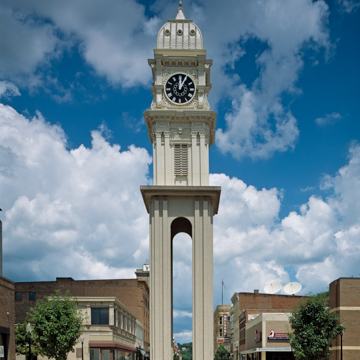Dubuque has long been fascinated with the public clock. Its first town clock (1864) rose from a simple Greek Revival building, but in contrast to the plainness of the building, the clock tower was exuberantly Italianate. This first clock tower collapsed in 1872. It was replaced the following year by an equally exuberant French Second Empire design by Fridolin Heer, Sr. Before the three-story Ruskinian Gothic building upon which the tower had been placed was demolished, the tower itself was moved to Town Clock Plaza, where it became the centerpiece of the park's design. The tower now sits on a high arched brick base and functions as would a folly in an English Picturesque garden. The only major item missing is the original rooftop weather vane with an immense cast-iron “key to the city.”
You are here
Town Clock Plaza
1873, Barton-Aschman Associates (clock and tower, Fridolin Heer, Sr.; relocated 1971); 1967 and later. Main St., below 5th and 9th streets
If SAH Archipedia has been useful to you, please consider supporting it.
SAH Archipedia tells the story of the United States through its buildings, landscapes, and cities. This freely available resource empowers the public with authoritative knowledge that deepens their understanding and appreciation of the built environment. But the Society of Architectural Historians, which created SAH Archipedia with University of Virginia Press, needs your support to maintain the high-caliber research, writing, photography, cartography, editing, design, and programming that make SAH Archipedia a trusted online resource available to all who value the history of place, heritage tourism, and learning.








